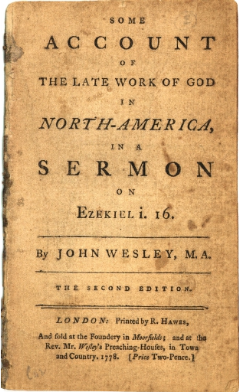What the Fall and Rise of Colonial America Portends for Us, 239 Years Later
by  Stephen Leykauf, stephenpaulleykauf@gmail.com
Stephen Leykauf, stephenpaulleykauf@gmail.com
John Wesley’s Some Account of the Late Work of God in North America, published in 1778, provides insight into the decline, preceding the rise in America during and immediately following the War for Independence. And that decline illuminates our understanding of our present decline, over two centuries later.
According to Wesley’s message, “The immense trade of America brought in an immense flow of wealth, which was also increasing.” Wealth led to pride and the pretentiousness that accompanies being wealthier than one’s neighbors.
The “natural consequence of wealth was luxury”; and sloth easily sprang from luxury.
Wesley had “received several letters from America” giving gloomy accounts of the state of religion in the colonies, and pleading that some of England’s preachers would come over and help. So several preachers went over – the first recorded missionaries to America. With the addition of American preachers to the British preachers, there came to be 22 travelling preachers in America who faithfully kept their circuits.
A spirit of independence had been rising in the colonies. The Stamp Act was the beginning of the colonists overthrowing their yoke of oppression. War with Great Britain cut off at least 90% of the trade that had brought wealth. Prosperity declined with collapsing wealth until universal poverty came to the colonies. Scarcity succeeded abundance. Colonists’ wealth died with the death of the colonies’ trade.
Pride largely vanished as the humility of impoverishment removed its grand incentive. Then luxury died. Then sloth disappeared. “Thus they were reduced to the same condition their forefathers were in when the providence of God brought them into this country.”
“What God foresaw would prove the remedy, grew up with the disease”; and when the disease reached maturity, only then did healing begin. The same trade, wealth, and luxury that begot pride and sloth, also begot their spirit of independence. And the same spirit of independence quickly destroyed trade and wealth – and wealth’s progenies, pride and sloth.
So an all-wise God brought unspeakable good out of the transgressions wealth spawned.
So poverty was first the punishment, but then the healing.
God punished that he might correct, but then brought them back to the spirit of humility, temperance, and industry – even the willingness to “receive the Word that is able to save their souls” . . . the spirit of their forefathers.
God permitted punishment “that they should all minister to the general spread of righteousness”. “But after the inhabitants are brought again to ‘seek first the Kingdom of God and His righteousness,’ there can be no doubt but all other things, all temporal blessings, will be added unto them”.
Wealth has returned, as we celebrate Independence Day 2017. We live in a nation of plenty. America’s prosperity has brought wealth. And we have become great in our own eyes. For has prosperity not come by our own hand?
In our self-admiration it is too often easy to forget the true source of our prosperity, that every good gift “cometh down from the Father of lights”. In a grievous miscalculation of our own strength, we could meet our needs, or tap into the storehouse that is our government. Thus our dependence upon God faded.
So we discontinued petitioning the Father, “Give us this day, our daily bread.”
Will God graciously bring poverty or other healing to make us vessels worthy to inherit His Kingdom?
Like it was said of our forefathers, will it also be said of us: “God punished that he might correct, but then brought them back to the spirit of humility, temperance, and industry – even the willingness to “receive the Word that is able to save their souls” . . . the spirit of their forefathers.”?









